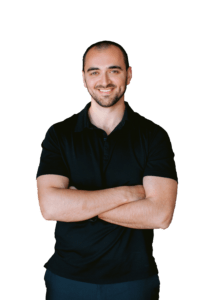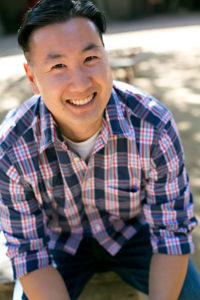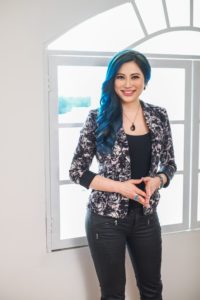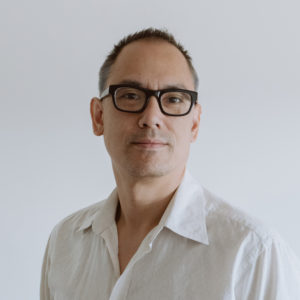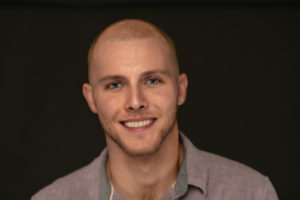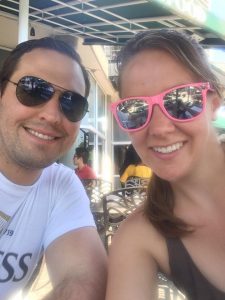Denis O’Brien [0:37]
Hey Money Clan, a very warm welcome to the Chain of Wealth podcast. I’m your host Denis O’Brien.
Katie Welsh [0:49]
And I’m Katie Welsh.
Denis O’Brien [0:50]
So Katie, really cool conversation today with Brandon. And I really thought that he had a very different take on life. But however, it’s the path less traveled, but that doesn’t mean it doesn’t work. Brandon is living everybody’s best life.
Katie Welsh [1:4]
Yeah, so he’s got several successful online businesses. He’s traveling around the world and he’s ready created a freedom life if there was a better term for us. Yeah, well, what I like about it is what Brandon makes it so that could be attainable for anybody. Yeah, the way he broke it down and what he did, while we were chatting them the whole time, I was like, oh, that doesn’t sound so hard. Yeah, so hundred percent.
Denis O’Brien [1:29]
So if you guys haven’t already we’re looking to give away a debt course to you guys so head on over to chainofwealth.com/debtcourse. We’re only accepting five people and so our sponsorship so definitely apply. Okay to get ready to dive right in?
Katie Welsh [1:43]
Yes!
Denis O’Brien [1:44]
Fantastic. Let’s start.
Denis O’Brien [1:59]
In his 10th year traveling the world with his family successful four hour workweek entrepreneur and founder of the family adventure summit, Brandon Pierce is passionate about living life to the fullest, while inspiring others to live their heartfelt dreams. His first online business music teachers helper has funded their entire travel lifestyle, now requiring just one hour per week of Brandon’s time traveling and living with his wife and three daughters now ages 15, 13 and 7 in over 43 countries has been a catalyst for learning, personal growth and family bonding.
Denis O’Brien [2:36]
Now Brandon fills his life with passion projects that serve families who wants to live with more intention, adventure and connection. Brandon has been featured on Tim Ferriss four hour blog, and writes about his adventures at peaceonearth.com.
Welcome.
Brandon Pearce [2:53]
Hello, thank you for having me on the show.
Katie Welsh [2:55]
Yeah, of course. So since you travel all over the world, where are you right now?
Brandon Pearce [2:59]
Right now I am right now in Bali, Indonesia.
Katie Welsh [3:3]
Awesome. And where are you going to next?
Brandon Pearce [3:6]
Next we will be Germany. We’re heading out in a couple of weeks and we’ll be doing a road trip through several countries in Europe culminating in running our retreat there in Transylvania at home in the world retreat at the beginning of July.
Katie Welsh [3:17]
Wow. That is very cool.
Katie Welsh [3:50]
Okay, because we all want to live that kind of life. I have a couple questions for you, what made you want to start an online business?
Brandon Pearce [3:31]
There were a few things that kicked it off for me. The first was back when I was I was actually working in a call center, making very low wages and teaching piano lessons on the weekends. And just playing around programming a little bit and started building this software to help you keep track of my piano students better.
Brandon Pearce [3:50]
And I had no intention to turn that into a business or anything like that. But I was seeing people in my life losing their jobs. I was I was studying to be a computer programmer. And I was seeing people in the IT industry lose their jobs, not because they done anything wrong, but just because the company was downsizing or whatever.
Brandon Pearce [4:8]
And I kind of woke up to this idea that, wow, maybe there’s no such thing as job security when you work for somebody else. And I started getting a strong feeling that I wanted to create an income source that could take care of my family, no matter what happened to me, and that I could have a little bit more control over.
Katie Welsh [4:26]
Okay
Brandon Pearce [4:26]
So that that launched me into turning this music teacher app that I had created this website into a business. And over years and years, it grew to the point where could support us.
Denis O’Brien [4:38]
That’s really cool. So I have to Ask, how much work really went into setting it up what we now call a “four hour workweek” business today. Now, like, obviously, like with anything, it takes a long time to sort of set something up and like build a business. And if you’re only sort of putting four hours in ,was it always like that really? Or did you sort of have this massive initial push, and now you just kind of maintaining it? What exactly does that look like for you?
Brandon Pearce [5:4]
I think it’s a little different for everybody. But for me, it was definitely a huge endeavor to get off the ground. As I mentioned, I was studying programming. I’d be programming since I was a kid. But I knew nothing about business. I knew nothing about marketing or graphics design or any of those things yet I had to teach myself I had to do those things as a business owner and everything was slow.
Brandon Pearce [5:30]
I was also doing it all in my spare time. So I would get up early in the morning, work really hard before work, I’d go to work, I’d work all through my lunch break, I’d come home, and I had a wife and a daughter at that point, and I wanted to spend time with them, but I spent as much time as I could, outside of that also, sometimes staying up late working on this business. During part of that time, I was also going to college and teaching private lessons and the weekends, there was a crazy time, it was crazy, probably 70-80 hour workweeks that I was putting in for probably a good couple, a good two or three years in order to get this business to the point where I was comfortable quitting my job, and then doing that more on a full time basis. So it did take a significant amount of effort, a significant amount of time, and some sacrifices in order to get to where it is now. It’s been a four hour workweek business literally for probably the past seven or eight years. And just this year, I hired a CEO to help run it. And now it’s a one hour workweek business for me. So it’s it is possible and I know many others who’ve done something similar.
Katie Welsh [6:31]
So thinking back, I feel like when you are juggling so much school and work and your family and then building this on their side, there had to have been mistakes that you probably made correct?
Brandon Pearce [6:47]
Absolutely. And I continue to make mistakes, to do things that I don’t understand. But it’s part of the adventure. Yeah.
Katie Welsh [6:55]
So looking back, what would you have done differently now? Knowing how successful it was? Is there anything that you would have changed?
Brandon Pearce [7:5]
You know, it’s hard to say because things were what they were the market was different back then. The tools were different. I was in a different place. But probably what I would have done was hire differently. I made a few mistakes in hiring people who maybe weren’t as qualified as they needed to be for the jobs that I hired them to do. For example, I hired a my first customer service people from India, and there was just like this call center place.
Brandon Pearce [7:32]
And they, they were not at all capable of offering the more heartfelt personal customer support that I was offering my customers. And I quickly realized that and had to let them go, and eventually came up with a solution to hire my customers as customer support agents and giving them a free account and paying them for every email they answer and that type of thing, which works much better. But that applies to many areas of the business, different programmers, I hired different different managers that I hired later on.
Brandon Pearce [8:2]
It’s taken me a long time to learn how to hire well. And how to really gauge not only a person’s skill level, but their ability to communicate effectively until the end to be a self starter. So that’s that’s a big lesson that I’ve had to learn.
Unknown Speaker]7:47]
So
Denis O’Brien [8:16]
So at what point did you kind of realize that the business was under two feet and that you could just sort of go back to four hours a week? Was there some kind of an income goal that you had for it or like what did it What did that really look like?
Brandon Pearce [8:29]
Yeah, well, when it was making around $1,500 a month, I decided, well, it was kind of almost forced upon me because I was getting so busy running it and working full time and doing all these things that I just said, I can’t keep doing all of this, I have to either quit my job or I have to stop doing this business because it’s, it’s too much. And I realized that the business was on a growth trajectory. I enjoyed it so much more than I did my job. And we had a little bit of buffer of savings. I had had some other on the side programming or web development clients and such. And I was confident we can make it work. So at $1,500 a month, I quit my job. And within the next year or two, it took off to the point where it was probably making around $8,000-$10,000 a month. And around that level. I said this is this is great. I’m hiring some help.
Brandon Pearce [9:21]
It’s probably before that I heard help. It’s been, you know, 15 years and now that I started this business started in 2004. So a lot of these details are hazy for me, but it was already 2008 or so, when we decided, you know, let’s we don’t know if this business can be run online and I don’t have this job anymore, we could do this from anywhere.
Brandon Pearce [9:40]
And we always wanted to travel as a family, and to expand our minds and to give our kids the opportunity to learn new languages and all of us to grow. So we decided to sell the house, we sold pretty much everything that we owned, and left it to to travel. And at that point, I said, I’m going to try this four hour workweek thing. And I had my first four hour workweek, literally, once we were on our first travel adventure, and I think it was in Panama, or it could have been Costa Rica, I think was Panama that they had that.
Katie Welsh [10:12]
So I have a question for you, quitting your stable job where you get a paycheck every two weeks or once a month or whatever however it is, and then your health insurance usually comes through that and your retirement accounts. What were you feeling when you decided to quit your job and solely rely on this, because that’s a big step.
Brandon Pearce [10:36]
It was a big step!I And there was a bit of fear there. I mean, I was probably making maybe $5,000 a month at my job. So to cut down to $1,500 and expect that I can grow the business to a similar level to provide for our expenses was a risk, you know, but we could we were living fairly lights, you know, we didn’t buy a lot of stuff. We didn’t have any subscriptions. We didn’t eat out a lot stuff like that. So we, I was confident I just I just saw the numbers I saw the trajectory and I also, more importantly, was listening to my heart and what it was that I I really believed in and that I wanted, and with that strength coming from within I was able to make that decision confidently. There were logistics to figure out with insurance and with different things, but it all worked itself out.
Denis O’Brien [11:30]
Fantastic. And so talking about the traveling aspects of having that conversation with your wife back, how did she take that and what was her reaction to it quits? And, you know, like, obviously you, you’re not just thinking about yourselves now you’ve got a daughter on teh way and you probably have more on the way at this point. And you know, like you probably were like, well, we’re going to be quitting like, what’s the impact with the kids as well?
Brandon Pearce [11:53]
Yeah, yeah, we had, I think two kids at the time. I think
Brandon Pearce [11:57]
I don’t honestly remember looking back, but I can imagine that she was seeing how busy I was, and how much I had going on. And I think she also believed in what we were doing. We were meeting people, our customers now in the business who were just so thrilled with what we had created saying, This is the kind of program I’ve been looking for my whole teaching career. And they were spreading the word about it, and it was just growing. And so we believed in what we were doing, and I think that gave us the confidence to know that you know and we also saw again that the instability of and the lack of control you have when you work for somebody else it’s it’s not stable. I, you know, I think we we say is a stable job but it’s not necessarily stable we are at the mercy of your your employer at the mercy of the market. And you don’t really have control to increase your rates so much or to offer a new product or to do other things to increase your income as much as you do when you have a business.
Katie Welsh [13:0]
Most definitely. So I always like hearing the dirty details of the business and what really goes on with making it, so did you have like any big mistakes that you made along the way where you’re like, Oh, well, that was a bad idea.
Brandon Pearce [13:18]
Um only looking back only in hindsight, right. I mean, I had a few a few snack foods like where I sent accidentally sent email to all of my customers.
Brandon Pearce [13:29]
Like the wrong email or as meant meant to send it to one person, I sent it to everybody something like that. And like, Oh, no!
Brandon Pearce [13:37]
But looking back, it was more things like the hiring that I had mentioned earlier, but yeah, there were just just small things like that. And in hindsight there, there were things that I would probably do differently, but overall retail,
Katie Welsh [13:55]
Ultimately, no, that’s incredible. So if you were to start another business, what do you think it would be?
Brandon Pearce [14:3]
Well, I already have started several.
Brandon Pearce [14:7]
So right now I am, I guess you could say in the event business, I run events for families interested in living more intentionally. So we have every year the family adventure summit. This came out of this event we run every year in different countries, and 400 people come together to celebrate long term travel, entrepreneurship location, industry. alternative education, these types of topics, just living a life that is fulfilling and, and meaningful and adventurous. But this came because of many things I was looking for a way to, to kind of give back with some of the things that that we had learned and also to create more community for ourselves. Because in our travels, we move so much that often it’s we missing our friends. And it’s kind of a chance to get together with with really cool people at least once a year.
Brandon Pearce [14:58]
So the businesses that I create now, I really enjoy doing businesses that I’m passionate about, and things that are also kind of a stretch for me. So I’d never done any event planning before I’d attended several events, several conferences and different business seminars and some fun events and festivals and things. And I thought they were great, but I had no idea how to run them. But I thought that sounds like fun. Let’s, let’s see what let’s see what would happen. And our first year we had 200 people there and we did it in Canada.
Brandon Pearce [15:29]
Last year, we did it in Mexico, and we had 400 people there. And it’s just been so fun to learn the skills that are required for something new. So, and also something that also feels a need for me. So that’s, I think one of the things that I’ve appreciated about the businesses I’ve created so far is that they’re not just helping other people, they’re also helping me. And that gives me incentive to continue working on them and and building them and making them amazing.
Denis O’Brien [15:57]
Yeah, and like I think also challenging yourself and jumping into new businesses can really, you know, like, it keeps you busy and keeps you engaged and interested in stuff. So with regards to your event business, would you say that, like who you generally targeting? Are you targeting like, say someone listen to this podcast and I want to like break the mold and quit my job and do my own thing and stop traveling. Would you say that that would appeal to someone like that? Or was it more someone that’s already done taking the leap and quit their job and they’ve been doing it for a few years.
Brandon Pearce [16:29]
Yes, and yes, we actually have two events will be a three events. But the one that I would recommend most for people who are just thinking about the idea or who wants to learn more about how to do it, that I would recommend the Family Adventure Academy. This is a three day event we put on we’re doing it this year in Seattle, a little closer to home for many Americans, Canadians. It’s August 16, through the 18th. It’s a three day really intense kind of boot camp style event for parents. So you leave the kids at home for this one. But it’s full deep dive into all the logistics of how to save money on travel, how to do it affordably save thousands of dollars on airfare, accommodations, all sorts of things, and how to make it also a meaningful and impactful experience for the family. We also have a full day on how to fund your travel, adventure and all the different ways you can learn. You can earn location, independent income, and then a full day on education, how to educate your kids from birth- University, various approaches and finding what really resonates for you and then weaving in relationship aspects and how to make it a bonding experience building great relationships with your family and also with the people you meet on the road.
Brandon Pearce [17:38]
So that’s family adventure Academy. That’s the one I’d recommend for people just starting out.
Brandon Pearce [17:42]
However, there are many people who just start out who come to the family adventure summit, which is in an international location every year. But that’s a, it takes a little more to buy a plane ticket to Bali and go for it for a week or two, or whatever it is, this year, it will be in Bali, if I didn’t mention that in October. But it’s a great mix. It’s a it’s you bring the family to that one. And it’s so much fun, and you’re surrounded by so many people who are intent on living with adventure and purpose in their lives. And it’s just so inspiring to be in that crowd. And so you, you it’s not the same structure program where we’re teaching you all of these things, but you learn a lot through osmosis in that type of event. And it’s a great community connecting kind of event.
Denis O’Brien [18:23]
Fantastic, and we’ll link to those in the show notes. So if you guys want to check it out, definitely hit on to our show notes page, you can check that out.
Denis O’Brien [18:31]
Money clan, we’re just going to take a quick break and then we’ll dive right back into the value link round
Denis O’Brien [18:37]
SPONSOR
We’re looking to give free access to our debt destruction course head on over to chainofwealth.com/debtcourse. This course is really aimed at people of any age with any kind of debts. We’re really trying to help bridge the gap and teach you how to get out of debt in the fastest way possible, while still being able to maintain a healthy lifestyle. Head on over to chainofwealth.com/debtcourse. As a reminder, we only have five slots available for the sponsorship and we’re going to really be reading everyone’s detailed replies.
Katie Welsh [19:17]
Okay, Brandon. So with all your traveling and and everything that you’re doing, what does your savings and retirement plan look like?
Brandon Pearce [19:26]
Yeah, good question. So I have, a ton of businesses that are generating cash flow each month. However, investment wise, I like to have a diversified portfolio. So I have several real estate investments. I currently have a four Plex, in Utah, a single family rental in Cleveland, which I’ve never been to. A vacation rental property in Bali and also one in San Diego, they and then Mexico, these are all properties that picked up over my travels. And they’re all doing all right. But actually, I’m planning to sell the Cleveland and Utah properties, potentially buy something else, perhaps an apartment building or something in the future.
Brandon Pearce [20:5]
So I really love real estate in for so many reasons if you can find a good cash flowing property, because it just generates income continuously. And the values tends to go up over time. And it’s a physical asset that’s always there. Something you can sell businesses can be wonderful assets too. But if you make a mistake or you don’t know what you’re doing, or the market changes it’s easy for the values to go down much more quickly than with real estate.
Brandon Pearce [20:5]
I also have, you know, some IRAs and some money in IRAs I, they’re in mutual funds with Vanguard, although, I’ve started investing less and less in mutual funds, stocks, they’re just an index funds. But just because again, there’s I have no control over it, it feels like gambling to me investing in stocks and mutual funds.
Brandon Pearce [20:57]
I’m just putting money into a system where I’m trusting that other people are going to manage those funds well and do something good in this business and I have no absolutely no control over that. So I put less and less into that. I also have I’ve diversified into precious metals. I have some some gold and silver stored in a vault in Singapore. I’ve got a little bit of cryptocurrency, joining with that a little bit, just a small percentage of my portfolio, trying to just diversify in as many ways as I can and keeping a decent allocation so that if something tragic happens in one part of the world or one sector of the market, it won’t affect my entire livelihood.
Denis O’Brien [21:36]
Yeah, and that’s a real good strategy.
Brandon Pearce [21:38]
You know, I’ve tried to put my money in different sort of baskets and that way you already protected if something does happen.
Denis O’Brien [21:44]
So I have to ask with regards to your real estate investments, how was it sort of buying a property you’ve never seen before?
Brandon Pearce [21:52]
Well, I did that, actually with the four Plex. And with Cleveland, I had not seen the property I was living in Costa Rica, when I bought the Utah four Plex, that was made easier for me because I grew up in Salt Lake, and I had an agent there who I really trusted. And so I was familiar with, with the market familiar with a lot of things. And he went in and took photos for me and I trusted him and it all worked out great. And it ended up appreciating a lot in value, which is what allowed us to buy the Mexico house, incidentally, I was able to take out home equity line to purchase that in cash. So that was great.
Brandon Pearce [22:24]
With Cleveland, I have never been to Cleveland. I don’t believe in buying investments that I don’t understand. So I did a lot of research into the area, finding out what neighborhoods are good. Looking at maps and contacting brokers and property managers and all sorts of things. I ended up buying a house there for $49,000. It was a three bedroom house and ended up finding a contractor put another $20,000 into some remodeling for the kitchen and different areas. It didn’t end up renting for as much as I’d hoped I was hoping to get around $1,300 a month out of it. It’s rented for I think around $1,100. And so it’s not really cash flowing got great. And that’s one reason I’m looking to sell it. I also made a mistake here.
Brandon Pearce [22:25]
So I didn’t end up paying for a proper third party inspection for the property. And after I bought it, I found there was some plumbing issues in there some other other things that weren’t caught, which increased my expenses in the in the renovation. But now I didn’t imagine mention the property’s worth around $85,000- $90,000. So I may make a little bit of profits in in kind of flipping this. It’s not really a flip. I’ve had it for about a year now. But it’s it’s almost a breakeven deal for me. So it wasn’t a fantastic investment. If I were to hang on to it, it would, you know, and rents and I was able to increase the rents over time, I would, you know, probably making a few hundred dollars a month from it. But at this point, I’d rather have the cash to invest in something that’s more lucrative.
Brandon Pearce [23:16]
This wasn’t the case in Utah, but in Cleveland, they have something called the point of sale inspection. So in order to sell a property, it has to pass a point of sale inspection, which means the city comes in and inspect the property and anything they don’t like about it, they require you to fix it. And before you can buy the property. So they came in and they did this inspection, there were a few things and and fixed them. And I thought that’s that I felt pretty thorough, you know, they were wanting me to fix little roof tiles and paint different things. I’m like, wow, they must have cut everything.
Denis O’Brien [24:10]
Yeah, makes sense. So do you have a favorite book that you’re currently into?
Brandon Pearce [24:33]
Yeah, sure. Hey, along those lines, I’m reading a book right now called… Let me pull it up… It’s called crushing it, I believe. It’s a book about commercial real estate investing. I’m not so interested in for example, storefronts and shopping malls and such but more apartment buildings, anything more than five units is considered commercial real estate. And I just like the economy of scale for that just how there’s so many doors that if you know there’s one or two people who wanted units that need to be vacant, or the repairs or whatever it did doesn’t affect the entire cash flow the property to significantly so it’s called crushing it. Something about apartments in commercial real estate by Brian Murray. It looks like that’s the book I’m reading right now that I very much enjoy.
Katie Welsh [25:24]
Awesome. And do you have a favorite quote you like to live by?
Brandon Pearce [25:28]
One of my favorite rich is a quote by Howard Thurman, he says, Don’t ask what the world needs. Ask what makes you come alive. And go do that. Because what the world needs is people who have come alive.
Katie Welsh [25:43]
I love that.
Denis O’Brien [25:44]
Brandon we’ve absolutely loved hanging out today, do you have another last parting piece of advice for our listeners, and then we’ll say goodbye.
Brandon Pearce [25:52]
I would say learn, learn, learn, learn as much as you can and learn from learn from everybody. But especially from a financial perspective, learn from those who are where you would like to be and see how they were able to get where they are. Whether through books or in person. It’s just a there’s so much great information out there and so many things we can learn. But along with the learning, I found it’s also crucial to not just follow someone else’s path because it worked for them but to really follow your own path. For me personally follow my own my heart follow my own path. And that has led to great fulfillment in many ways.
Denis O’Brien [26:33]
Money Clan, we’ve been hanging out with Brandon Pearce, you can check out his website, its pearceonearth.com. And pivoting on what he said definitely focus on learning, you can really never learn too much and you can always have something else that you can sort of take and grow with.


